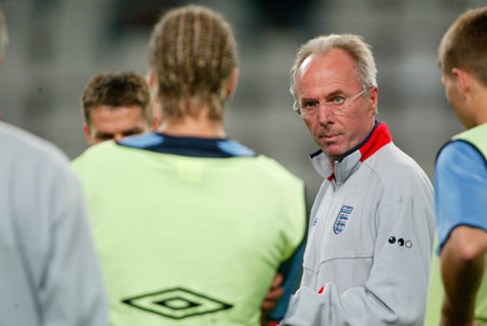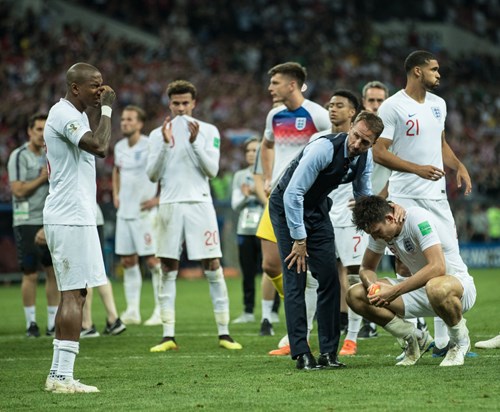The names roll off the tongue - Alan Shearer, Gary Neville, David Beckham, Rio Ferdinand, Steven Gerrard. The list of world-class names that graced the England squad either side of the turn of the century led to talks that these were amongst the best teams England had ever boasted and that maybe, just maybe, it was finally England’s time.
Premier League titles, the domestic treble, countless Champions Leagues, the teams consisted of instinctive winners, hungry for more success with one mutual thing missing from their trophy cabinets – a major international title. But for a series of endlessly analysed, yet largely unknown reasons, the talent-fuelled forces failed to fulfil the grand hopes of the nation.
What, then, can the current England squad, bursting with talent of a similar calibre, do to learn from the mistakes of Euro 96 and, shortly after, the so called ‘Golden Generation’? We’ve put together a list of ways in which the England side can alter their form so history doesn’t repeat itself – again…

Shaping the team to include all the best players
A rigid 4-4-2 formation at both the 2006 and 2010 World Cup, and a stubborn refusal to drift from this, meant that it was difficult to exploit the playing powers of both Gerrard and Frank Lampard, two of the squad’s most talented, towering midfielders with eminent experience. The renowned lack of success the pair experienced in an England shirt – only ever directly involved in the same goal once – baffles fans to this day and is considered one of the key failings of this generation of players.
Developments in coaching in recent years have, however, allowed for far more flexible and experimental player formations on the pitch. This may work in England’s favour, as Phil Foden, Mason Mount and Jadon Sancho have all burst onto the scene since the World Cup three years ago and have rightfully earned a place in the provisional squad.
Playing all three of these quick-footed attacking-midfielders, alongside the magnificent Harry Kane, won’t necessarily be easy, but prioritising the most talented players will ultimately make for a better team, and with that a better chance of going all the way in the tournament.
Another criticism flung at England’s Golden Generation was the relentless squad rotation – they lacked a consistent starting 11 which many claimed fractured the team spirit in the dressing room, as well as knocking their chances on the pitch. But in Russia three years ago,
Gareth Southgate seemed intent on creating a consistent side, with ten of the starting 11 remaining unchanged throughout the tournament with the exception of an almost irrelevant group qualifier.
Finding a way to deal with the pressure from media and fans
‘30 years of hurt’ were the cries ringing around the nation the last time England played host to a major tournament in 1996. Now 25 years on, and 55 years since their historic World Cup win, the drought lives on. But as the nation’s thirst for international success grows, the media – and all of us as fans – must learn from the mistakes of the past and not pound the pressure on this relatively young England squad.
It’s tempting to revel in the exquisite talent of Foden, Jude Bellingham, Trent Alexander-Arnold, and many more, particularly with the tournament being played on home soil. But we mustn’t thrust them into the limelight to the point that it risks jeopardising their performance on the pitch. Nor must we risk their resentment and animosity, which is, Stuart Pearce claims, exactly what happened at Euro ’96 when he was representing England.
Speaking exclusively to UCFB, he said: “The media and fans can’t help but place a load of pressure on England, sadly. I always felt as though there was angst between the media and the squad [at Euro 96].”
But perhaps this is beginning to change. He added: “I see a real difference now and feeling around the England squad than when I played in it. I think there’s a better connection between the supporters, the media and the England squad. I think there’s a real support of the team, I really do.”
Southgate, England’s much-loved manager, has had a huge part to play in this shift in relationship. His refreshing humility, and promising track-record, have generated enormous amounts of respect from players, fans and the media alike. Having led the England Under-21 side for three years before taking over as First Team manager in 2016, the 50-year-old is surely better placed than his predecessors in handling less experienced players on the grandest of stages.
But the players themselves must also find their own, perhaps individual, ways of dealing with the immense, inescapable pressure that will only build as the tournament progresses. Many of them gained experience, and hard-learned lessons, from the semi-final defeat at the 2018 World Cup which will ensure they enter Euro 2020 better prepared for what’s to come – both on and off the pitch.

Overcoming club rivalries
Gerrard, Lampard and Ferdinand have all claimed, since the 2006 World Cup in Germany, that their fierce club rivalries at the time battered the team spirit that’s undoubtedly required to win a major tournament. While Sven-Göran Eriksson emphatically refutes this, it’s often proposed as one of the key reasons that the sum never quite lived up to its individual parts for England’s Golden Generation.
With the Premier League more successful, and competitive, than ever, and an all-English Champions League final featuring some of the country’s brightest stars less than two weeks before the start of the Euros, players will have to quickly adapt their mindsets and abandon their club allegiances.
Perhaps it is important not to underestimate club loyalties. They inevitably exist and influence individual mentalities to a degree, but players must learn to manage these and compartmentalise different aspects of their playing career. Recent surges of interest in the psychology of footballers may also play to their advantage as more focus is placed on ensuring players feel comfortable and supported beyond the 90 minutes on the pitch.
Coronavirus, and its devastating effects on the country, may inadvertently help the sense of comradery in England’s dressing room. The postponed date, of which we’re constantly reminded by the name ‘Euro 2020’, hopefully marks the beginning of the end of a long year of suffering, which may unite the country for the tournament like never before. Its significance extends far beyond football, which will no doubt filter through to and be felt by the players leading this sporting renaissance. The unbelievable, unprecedented circumstances of Euro 2020 might just help players overlook the frivolous issue of club rivalries getting in the way.




















